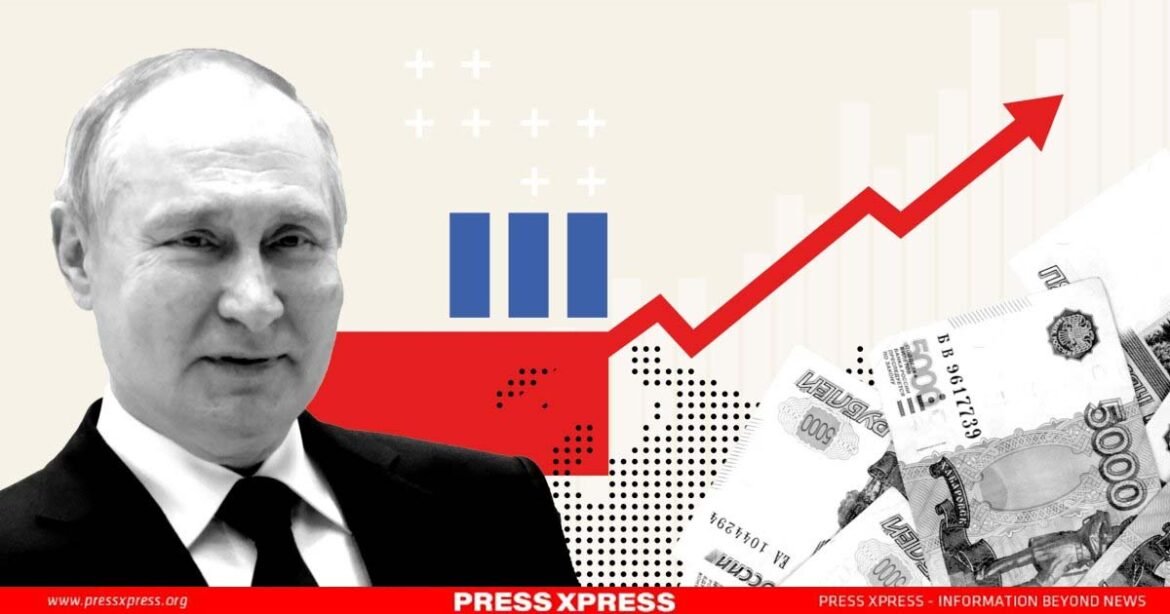Key Highlights:
- Russia maintained its position with GDP at PPP of $6 trillion and $6.45 trillion, respectively.
- Putin targets Russia as 4th largest economy by PPP by March 31, 2025
At the forefront of global economic dynamics, Russia has emerged as the fourth-largest economy in the world in terms of purchasing power parity (PPP), according to the World Bank’s latest data released at the onset of June. This marks a significant milestone in Russia’s economic trajectory.
You can also read: Putin Threatens Western Countries to Carry Consequential Hit Risk
Russia’s rise to fourth place reflects its earlier overtaking of Germany, signaling a notable shift in global economic rankings. Germany’s economic challenges, exacerbated by multiple shocks and disruptions in the supply of Russian gas, have led to stagnation, relegating the country to sixth place in the World Bank’s assessment.

According to updated data from the World Bank, the Russian economy has become the world’s 4th largest economy by purchasing power parity as early as 2021.
The World Bank on Thursday updated the data on purchasing power parity (PPP) indicators. They show that back in 2021 Russia had accounted for 3.8% of global GDP, outshining Japan (3.7%) and Germany (3.4%).
Russian GDP at PPP in 2021 reached $5.7 trillion, while the numbers for Japan and Germany were $5.6 trillion and $5.2 trillion, respectively.

Russia Maintains Position in 2022-2023
In 2022-2023, according to calculations by RIA Novosti, Russia clung to the positions it had achieved with $6 trillion and $6.45 trillion in those respective years, compared to $5.9 trillion and $6.3 trillion for Japan, and $5.5 trillion and $5.9 trillion for Germany. China leads with $35 trillion, followed by the US with $27.4 trillion and India with $14.6 trillion.
Previous Estimates Based on 2017 Data
In February, it was reported that Russia became the first and foremost economy in Europe and the fifth in the world in terms of purchasing power parity. However, the calculations were based on data from 2017. On Thursday, the World Bank updated them with information for 2021.
Putin’s Goal of 4th Largest PPP Economy
Russian President Vladimir Putin had previously established the goal of positioning Russia as the fourth-largest economy in the world in terms of purchasing power parity (PPP). In line with this objective, the Cabinet of Ministers was tasked with developing and implementing measures to achieve this goal by March 31, 2025.
Russian President Vladimir Putin’s strategic directives have been instrumental in driving the country’s economic agenda forward. Setting ambitious targets, including the goal of attaining fourth place in PPP terms, Putin’s vision emphasizes economic growth ahead of the global average, positioning Russia as a formidable player on the global stage.
Geopolitical Strategy
By diverging from traditional Western alliances and embracing the Global South Century, Putin has strategically positioned Russia to capitalize on emerging opportunities. With China and India leading in PPP terms, Putin’s geopolitical bet underscores Russia’s commitment to fostering alliances beyond conventional boundaries.
Russia’s economic transformation, characterized by a departure from austerity measures, has ushered in a new era of investment-led growth, known as Putinomics. Simultaneously, investments in both military and civilian sectors through initiatives like the National Projects 2.1 program aim to bolster infrastructure and improve living standards, enhancing the quality of life for citizens.
Economists project Russia’s growth potential to soar, from pre-war levels of 1-1.5% to around 3.5% presently, signaling a robust recovery. Despite the World Bank’s PPP-adjusted estimate, concerns persist regarding the shadow economy’s impact on accurate measurements. Addressing shadow economy dynamics is imperative for a comprehensive assessment of Russia’s economic landscape.
The International Monetary Fund (IMF) projects Russia to grow by 3.2% this year, significantly outpacing the UK, France, and Germany. The IMF attributes this growth to steady oil exports and high government spending. Despite sanctions over its invasion of Ukraine, Russia’s economic outlook has improved, with a forecasted 1.8% growth in 2025.

IMF’s Predictions
The IMF commended the global economy’s resilience, noting that it avoided a recession and the banking system remained stable. Most advanced economies’ growth predictions are generally accurate within 1.5 percentage points.
The UK, however, faces downgraded growth forecasts of 0.5% this year, making it the second weakest performer in the G7. Growth is expected to rise to 1.5% by 2025, with high inflation and interest rates projected until 2029. Chancellor Jeremy Hunt sees the IMF’s figures as an indication of the UK’s economic recovery, highlighting expected improvements in inflation and growth compared to Germany and France.
Conclusion
Russia’s ascendancy to the fourth-largest economy by PPP underscores its resilience and strategic foresight. As geopolitical dynamics continue to evolve, Russia’s economic trajectory remains a focal point of global interest, with far-reaching implications for regional and international affairs.


